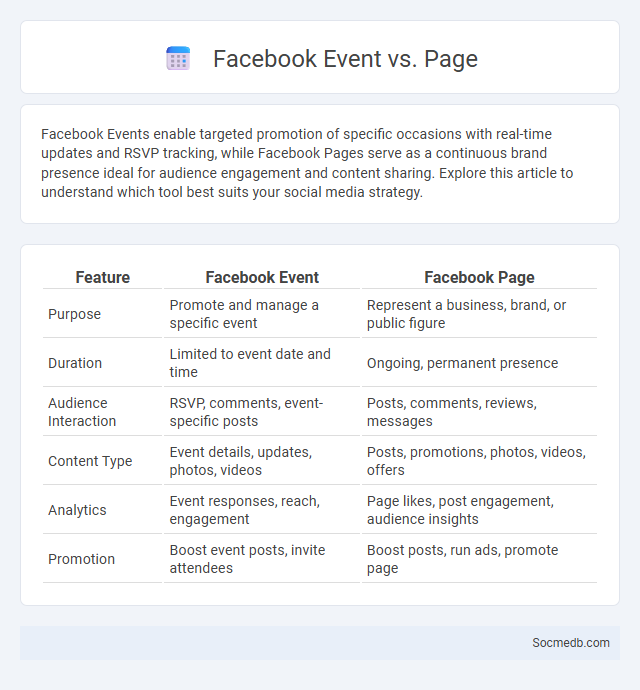
Photo illustration: Facebook Event vs Page
Facebook Events enable targeted promotion of specific occasions with real-time updates and RSVP tracking, while Facebook Pages serve as a continuous brand presence ideal for audience engagement and content sharing. Explore this article to understand which tool best suits your social media strategy.
Table of Comparison
| Feature | Facebook Event | Facebook Page |
|---|---|---|
| Purpose | Promote and manage a specific event | Represent a business, brand, or public figure |
| Duration | Limited to event date and time | Ongoing, permanent presence |
| Audience Interaction | RSVP, comments, event-specific posts | Posts, comments, reviews, messages |
| Content Type | Event details, updates, photos, videos | Posts, promotions, photos, videos, offers |
| Analytics | Event responses, reach, engagement | Page likes, post engagement, audience insights |
| Promotion | Boost event posts, invite attendees | Boost posts, run ads, promote page |
Understanding Facebook Events: Definition and Purpose
Facebook Events are digital gatherings created on the Facebook platform to organize and promote activities, ranging from small private parties to large public conferences. These events allow users to RSVP, share event details, post updates, and engage with other attendees, enhancing social interaction and event planning efficiency. Leveraging Facebook Events helps increase visibility and attendance by tapping into targeted social networks and personalized notifications.
What is a Facebook Page? Key Features and Uses
A Facebook Page is a public profile specifically designed for businesses, brands, celebrities, and organizations to connect with their audience on Facebook. Key features include customizable tabs, detailed analytics through Facebook Insights, and advertising options to boost posts and promote products or events. You can use your Facebook Page to build community engagement, share updates, and drive traffic to your website or physical location effectively.
Comparing Facebook Events vs Pages: Core Differences
Facebook Events focus on promoting specific occasions, allowing You to schedule, invite, and track RSVPs for targeted audience engagement. In contrast, Facebook Pages serve as ongoing public profiles to build brand identity, share updates, and interact continuously with followers. The core difference lies in Events being time-bound and action-driven, while Pages provide a comprehensive platform for sustained communication and community building.
Creating a Facebook Event: Step-by-Step Overview
Creating a Facebook Event involves selecting the "Events" option from the Facebook menu, then clicking "Create New Event" to enter event details such as name, date, time, location, and description. Optimizing event visibility includes choosing a public or private setting, adding a cover photo, and inviting friends or followers to boost engagement. Utilizing Facebook's event tools like ticketing integration and automated reminders increases attendee management efficiency and event success.
The Role of a Facebook Page in Community Building
A Facebook Page serves as a central hub for community building by enabling direct interaction between organizations and their audience through posts, comments, and messaging. It facilitates engagement by sharing real-time updates, events, and multimedia content that resonate with community interests and values. Analytics tools on Facebook Pages help admins understand audience behavior, optimize content, and strengthen connections within the community.
Audience Engagement: Events vs Pages
Events on social media create time-sensitive opportunities that encourage users to interact through RSVPs, comments, and shares, driving higher engagement during specific moments. Pages offer a continuous platform for brands or individuals to build loyalty and maintain ongoing communication by regularly posting content tailored to their audience interests. Your strategy should balance leveraging Events for immediate, focused interaction and Pages for sustained community connection and brand presence.
Promotions: When to Use a Facebook Event or Page
Use a Facebook Event to promote time-sensitive occasions like product launches, sales, or webinars that require RSVP tracking and targeted reminders. Opt for a Facebook Page when building ongoing brand presence, sharing updates, and engaging with your audience long-term. Your choice impacts engagement, so use Events for urgency and Pages for continuous customer relationship management.
Analytics: Measuring Success on Events and Pages
Social media analytics play a crucial role in measuring the success of events and pages by tracking key performance indicators such as engagement rates, reach, and conversion metrics. Tools like Facebook Insights, Twitter Analytics, and Google Analytics provide detailed data on user interaction, audience demographics, and traffic sources, enabling event organizers to optimize content strategies effectively. Leveraging these analytics helps businesses and marketers enhance audience targeting, improve content relevance, and achieve higher return on investment (ROI) for social media campaigns.
Best Practices for Using Events and Pages Together
Leveraging Facebook Events and Pages together enhances audience engagement by creating dedicated event pages linked to active business pages, promoting consistency in branding and messaging. Optimizing event descriptions with relevant keywords and detailed information increases discoverability, while regularly posting updates and interacting with attendees on both platforms drives higher participation rates. Tracking insights from both events and pages allows for data-driven adjustments to marketing strategies, ensuring effective outreach and sustained community growth.
Choosing the Right Tool: Event or Page for Your Goal
Choosing the right social media tool--event or page--directly impacts your engagement and reach. An event is ideal for time-specific activities, offering RSVP features and real-time updates, while a page provides a continual presence for branding and community building. Tailoring your choice to your goal ensures your audience connects with your content effectively.
 socmedb.com
socmedb.com